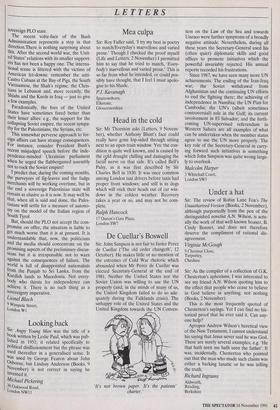De Cuellar 's Boswell
Sir: John Simpson is not fair to Javier Perez de Cuellar (`The old order changeth', 12 October). He makes little or no mention of the extremes of Cold War rhetoric which abounded when Mr Perez de Cuellar was elected Secretary-General at the end of 1981. Neither the United States nor the Soviet Union was willing to use the UN properly (and, in the minds of many of us, the United Kingdom failed to do so ade- quately during the Falklands crisis). The unhappy role of the United States and the United Kingdom towards the UN Conven- not brown paper. It's the patients' charter.' tion on the Law of the Sea and towards Unesco were further symptoms of a broadly negative attitude. Nevertheless, during all these years the Secretary-General used his (often quiet) diplomatic skills and good offices to promote initiatives which the powerful invariably rejected. His annual reports recorded his frustrations.
Since 1987, we have seen many more UN achievements. The ending of the Iran-Iraq war; the Soviet withdrawal from Afghanistan and the continuing UN efforts to end the fighting there; the achieving of independence in Namibia; the UN Plan for Cambodia; the UN's (albeit sometimes controversial) role in the Gulf; its current involvement in El Salvador; and the forth- coming UN-supervised referendum in Western Sahara are all examples of what can be undertaken when the member states agree to use the UN more properly. The key role of the Secretary-General in carry- ing forward such initiatives is something which John Simpson was quite wrong large- ly to overlook.
Malcolm Harper
3 Whitehall Court, London SW1










































































 Previous page
Previous page